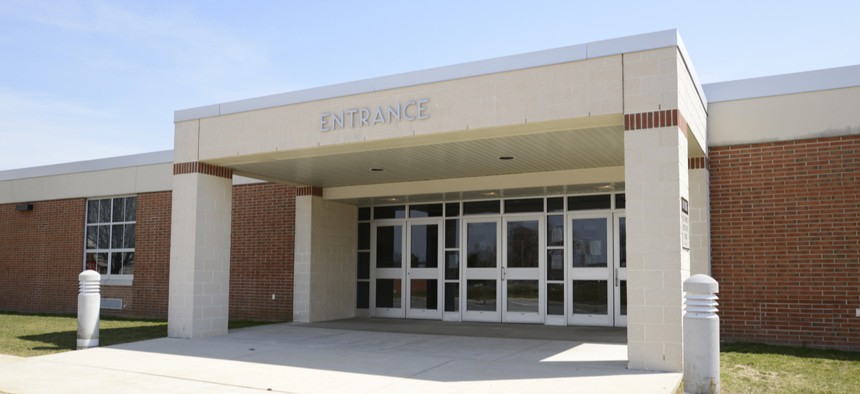New Tech Opens New Doors for Public Safety

Several emerging technologies can help to modernize school safety measures. Cynthia Farmer | SHUTTERSTOCK
COMMENTARY | The growing use of artificial intelligence will offer cities more advanced methods to detect safety and security threats.
In 2018, the Center for Homeland Defense and Security reported 110 K-12 school shooting incidents. That’s more than twice as many as the year prior and a record high since the center began compiling data on school shootings in 1970. Alarming statistics like these signal that it’s time to examine the old methods of detecting and mitigating danger in schools and other municipal infrastructure with a more critical eye.
Cities are beginning to recognize the need for newer, more technologically advanced methods of detecting both violent and nonviolent threats—and that also means reevaluating previous advances by asking how can we embrace new technology.
The revolution in artificial intelligence over the last few years has fueled the development of new security methods. Three new technologies, in particular, can help keep cities, residents and municipal buildings safer:
1. Concealed Weapon Detectors
Bulky full-body scanners are ugly and intimidating, while they can also cause bottlenecks at entryways and require security staff for oversight. Concealed weapon detectors eliminate these roadblocks. These devices embed microwave panels near entrances and exits to scan people and bags for concealed weapons, alerting either local law enforcement or on-site security staff of anything amiss in real time.
One early adopter of this technology is the Westgate Las Vegas Resort and Casino. The megacasino is testing out a weapon-sensing system that uses small units that can be hidden inside walls, doorways and other existing infrastructure. The system uses machine learning algorithms to detect guns, bombs and other threats. It’s a win-win: The resort has heightened security and guests no longer have to line up to walk through full-body scanners.
2. Automated Threat Detection
Passive security cameras can aid in crisis response only if someone is literally watching the footage in real time—not exactly practical or cost-effective. New AI tools, however, can automatically scan camera footage for threats, such as visible guns and knives. They can also track people or items as they move from camera to camera, piecing together a more complete picture of what’s going on. Essentially, these tools turn existing passive cameras into active threat-sensing infrastructure.
For example, Broward County Public Schools in Parkland, Florida, announced a year after the 2018 shooting at Marjory Stoneman Douglas High School that it would implement a security camera-software combination that can track students across campus. Guards can see video from every place a student has been recorded on campus with just one click. The technology can also alert the officer assigned to monitor the school of anything deemed out of the ordinary.
3. Automated Maintenance
Many cities and schools struggle to maintain their infrastructure. Hazards such as downed power lines and blown water mains are much more common than gun violence and are even more difficult to track. AI-enabled cameras and sensors can monitor infrastructure and identify problems as they occur—or even warn of an impending issue. This allows cities to perform immediate or preventive maintenance that catches problems before they become costly and keeps teachers and students safe.
For example, graduate students in Hoboken, New Jersey, are building and training AI robots to detect and inspect underwater infrastructure, such as bridge foundations, then generate a 3D map of the environment. It’s a safer and more cost-effective solution than having humans investigate.
These technologies have great potential to help make cities and government infrastructure not only safer, but also more welcoming. Smart cameras, for instance, can reduce the number of intimidating armed guards and concealed weapon detection panels can eradicate metal detectors. It’s time for municipalities to rethink security and consider how technology improves citizens’ safety.
Ben Ziomek is CPO and co-founder of Actuate. He is interested in AI-based product development and has experience in product management, AI and machine learning, sales and marketing technology, M&A, and commercial partnerships.
NEXT STORY: Coping With Loss Of Hospital, Rural Town Realizes: We Don’t Need A Hospital





